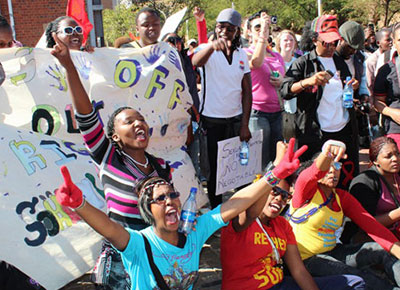TRADITIONAL COURTS BILL’S DEMISE: NOT SO FAST!

LGBT people protest in Johannesburg in 2012 against traditional leaders’ efforts to restrict LGBT rights.
In response to jubilation that the controversial Traditional courts Bill had been scrapped, the government has announced that reports of its demise have been exaggerated.
Last week Thursday, the Department of Justice and Constitutional Development (DOJ) issued a statement to “clarify the misconceptions and misleading statement by certain media implying that the Traditional Courts Bill has been withdrawn by Parliament or has reached a dead-end.”
DOJ spokesperson, Advocate Mthunzi Mhaga, confirmed that the “Traditional Courts Bill is still on the list of Bills that [are] still before Parliament” and that it could find new life after the elections.
He explained that while it is unlikely that Parliament will be able to finalise the Bill before the general elections, “as Government, we are hopeful that the Bill will be revived by the fifth democratic Parliament that will be elected during the forth-coming elections.”
The news is a blow to those who hoped that the proposed legislation, which has been widely condemned – even by members of the government, had been mothballed.
The bill aims to create a parallel system of justice in which traditional leaders in rural areas would be able to unilaterally decide on matters and hand out punishments on the basis of traditional and cultural law.
Civil Society groups have expressed concern that granting broad powers to traditional leaders and chiefs through the bill could lead to discriminatory actions and rulings against LGBT people and women.
There are unconfirmed reports that President Zuma was pressured by traditional leaders to not allow the proposed legislation to fall away, something that the ANC and Zuma would likely take into account ahead of the elections.
The bill has so far failed to receive sufficient support from the provinces to become law.
At a recent meeting, the National Council of Provinces (NCOP) select committee on security and constitutional development was told by a parliamentary law advisor that the bill is unconstitutional.
Leave a Reply